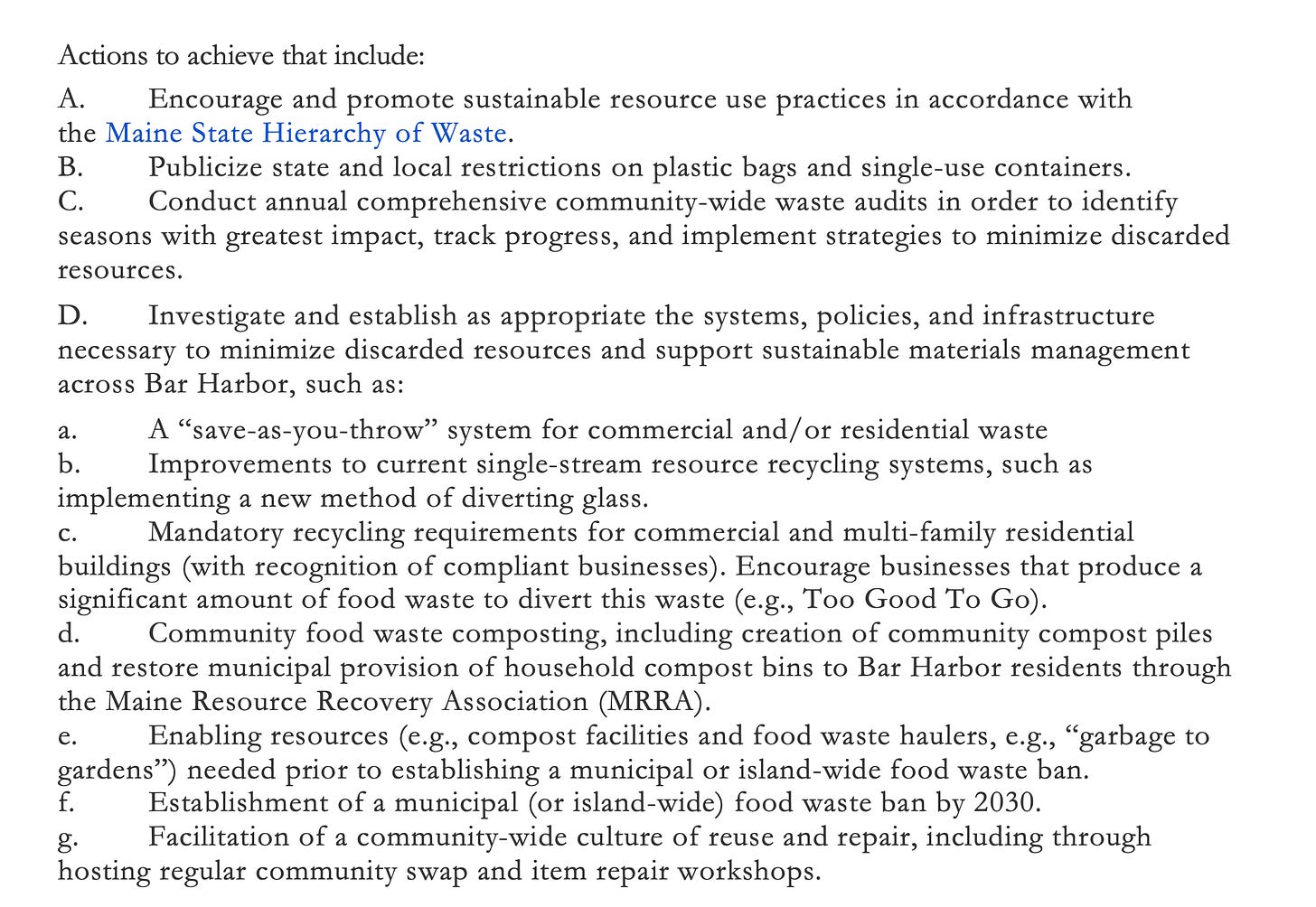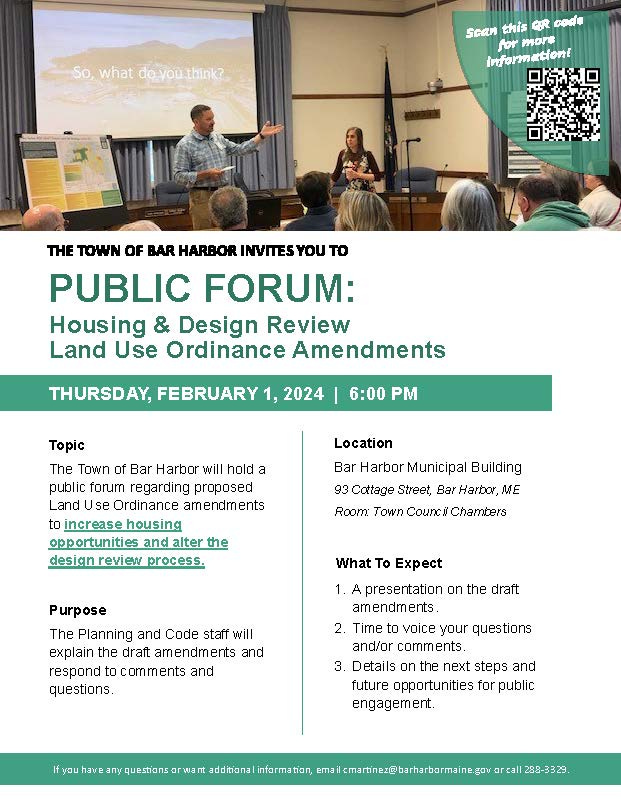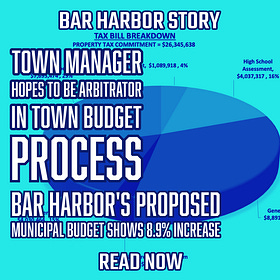Getting Rid of Trash is a Costly Business
Bar Harbor task force hopes to work with businesses to find ways to reduce waste
BAR HARBOR—Ketchup bottles that aren’t wide-mouthed any longer. Paper napkins instead of linen. Creamers in cups instead of in pitchers on tables. It all contributes to Bar Harbor’s trash stream. The Bar Harbor Task Force on the Climate Emergency and others want to reduce that.
Tom Testa’s family has been in the restaurant business for decades, he said, and in the 1970s, they didn’t use near the amount of paper products that they do now. They used linen napkins. They had creamery crocks on the table. Everything came in a glass bottle. But cream in pitchers became a sanitation issue. COVID only made the need for single-use items even larger. Things changed.
“There was not the plastic (back then). I’ve watched our waste increase hugely. What used to fill half a dumpster, today is an overflowing dumpster,” Testa said.
COVID was the high point for the volume of disposable products being used, he said, and they’ve noticed a decrease of volume since the summer of 2022. During COVID, there was a heavy use of multiple products meant to protect people from the virus and sanitize surfaces. Paper towels, cleaning and sanitizing products, gloves, masks, and single-use product were all meant to keep people healthy.
At the same time, delivery services like Amazon delivered more and more to residences. Cardboard boxes and packing plastic for commercial and residential uses were the norm and continue to be the norm.
Testa said a good deal of the reasons for the town’s waste stream begins with decisions made beyond the Maine and Bar Harbor border. Single use products impacts that. Bottle recycling started in the 1970s in Maine. Things are currently not only packaged for convenience but also safety and manufacturer’s liability. Bottles, he said, are a huge encumbrance for restaurants.
Even the ketchup bottle has changed. First it was in glass bottles. Now those bottles are plastic.
They used to be wide mouth. Now they are designed for top-side down, with the lid on the table, so they have to be thrown away rather than refilled and reused.
“Everything is designed so that they are disposable,” Tom St.Germain, another restaurant owner said.

Even case sizes now are smaller (three ten pound boxes rather than one 30 pound box) when salespeople and delivery providers are paid per box, the men said. More boxes equate to more garbage or more items in the waste stream.
The two business owners spoke via Zoom at a listening session where the Bar Harbor Chamber and the Bar Harbor Task Force on the Climate Emergency jointly hosted the business community on Thursday morning, January 18.
“A session where businesses were able to weigh in” and give examples of things that businesses are already doing,” Bar Harbor Chamber Director Everal Eaton said.
Brianna Cunliffe of A Climate to Thrive was at the discussion and is supporting the task force for multiple events. Ruth Poland moderated the discussion.
Just for trash, the problem is multifold. Glass isn’t being recycled. Some plastics are not recycled. Businesses are dealing with regulations meant to keep everyone healthy as well as outside shipping and packaging companies that make profits off multiple units. The town is dealing with similar issues.
The task force’s strategy five in its action plan is “Resource Consumption and Waste.”
Goals in the document, which can change, include:
Achieve a 75% residential and commercial waste diversion rate by 2026;
Achieve a 50% construction and municipal waste diversion rate by 2026;
Minimize all community-wide waste to the greatest extent possible by 2030;
Support the establishment of sustainable local food production and diversion systems across Mount Desert Island by doing some or all of the following:
A community cannery where people could bring their own produce and learn how to process things safely;
A community freezer for people that would like to raise animals, vegetables or fruit and don't have the room to freeze much food in their home;
A slaughterhouse to encourage livestock production;
Removal of code barriers to having a commercial kitchen in a residential area, having employees living on the farm, and/or having restrictions to offering take-out meals in a residential area.
PAST DECISIONS IMPACTING CURRENT SITUATION
Decisions from the past also have implications on current situations. The Maine Monitor’s Kate Cough recently wrote about a 2019 Bar Harbor Town Council decision to discontinue glass recycling in town because of the noise of the glass grinding in the bins.
“Councilors figured the glass would eventually be sorted out and recycled anyway at the new facility in Hampden, which was slated to open later that year.
“But that never happened. The Hampden facility remains closed, and Bar Harbor’s glass — one of the world’s most readily recyclable materials — is being buried in the landfill at Juniper Ridge, 66 miles north.
“Bar Harbor isn’t alone in throwing out something that could, in theory, be recycled. Between 2018 and 2022, the amount of municipal solid waste landfilled in Maine shot up 47 percent, from 388,629 tons in 2018 to 569,911 tons in 2022, according to a report released in early January by the Maine Department of Environmental Protection.”
Cough quotes Bar Harbor Public Works’ Office Manager Suzanne Banis as saying that the town pays Casella 2.5 times as much to take care of the town’s recycling as opposed to its trash.
Recycling is expensive. Waste is expensive, too.
The current budget for solid waste for the town is $996,658, but is projected to come closer to $1,162,100. Next year’s is currently proposed at $1,222,450, a 22.7% increase. Just one type of tipping (TIP) fee is $525,000. A tipping fee is the garbage disposal fee. There are multiple TIP fees in the draft budget and current budgets. The draft municipal budget process began Tuesday night, January 23 and continues throughout January and February with the voters having final say in June.
The problem with waste and cost, according to Cough, is widespread. She wrote, “The total amount of waste going to Maine landfills (including sludge, construction demolition debris, bulky waste and municipal solid waste) increased by 34 percent.”
GOALS AND COLLABORATION
The task force’s focus from its 2020 bylaws is to “define and recommend climate goals with the objective of draing down carbon from the the atmosphere and reducing community-wide greenhouse gas emissions by December 31, 2030.”
The three key responsibilities it leans toward are exploring opportunities for reductions in the community, developing a climate mobilization action plan, and educating and engaging Bar Harbor residents about “the climate emergency and broader ecological crisis.”
At the listening session, while agreeing that working together can be a goal, some business owners worried about making amends for something that happens hundreds of miles away, such as packaging decisions, but they were also looking for integrations and ways to help and get help, which was the theme of the session: how Bar Harbor businesses support and can be supported by the town’s Climate Action Plan.
Approximately six business representatives attended along with approximately five members of A Climate to Thrive and the town’s task force. The business members ranged from JAX, Versant, Sassafrass, and restaurant owners.
Task Force on the Climate Emergency member Brian Booher said that some of the problem is things that don’t change.
“You could walk around, find five cans, return them for 5 cents,” he said. “The returnable rate is still 5 cents.”
Some items, like that one, would need state or federal legislation to make changes that would help business owners and support the task force’s action plan. Attendees discussed the limited transportation infrastructure and need for green transportation, the ways green tourism can be supported, and the past Chamber program with Sustainable MDI.
Sustainable MDI was a business-focused initiative that looked at food waste, takeout materials, and other ways to reduce the waste stream. Collaborations with JAX, the use of biomass boilers, and continuing conversations about what effective next steps might look like were also discussed.
The task force is actively updating its plan. The first climate action plan was adopted in November of 2021. That included advocating for a sustainability coordinator. At a January 23 budget meeting, Town Manager James Smith did not include the position in his budget, but instead suggested $75,000 for related project management which would be contracted out.
“That role is not currently filled,” Poland said last week, before Smith’s announcement, and added that when it was filled for approximately five months in 2022-2023, the coordinator got the town a $50,000 grant for electrification work for the Bar Harbor Municipal Building. Part of the role was to proactively look for grants and ways to make the town more sustainable.
The task force, Poland said, is an advisory group for both the Bar Harbor Town Council and the town staff. It has helped the town receive two grants. The other grant received is regional and is for EV chargers, outreach, and education.
Strategy 6 of its action plan is a sustainable local economy.
Goals include:
Establish Bar Harbor as a leading green tourism destination by 2030.
Promote climate action as a key component of a sustainable, year-round local economy in Bar Harbor.
Poland also presented a timeline of the task force’s work.
PUBLIC FORUM
Bar Harbor is holding a public forum about the potential land use ordinance amendments that go before the voters in June. Per the Planning Department, “Add this event to your calendars if you want to learn more about the proposed Land Use Amendments!”
February 1, 2024
6:00-8:00 PM
93 Cottage Street, Bar Harbor
Town Council Chambers
Call 288-3329 if you have questions.
LINKS TO LEARN MORE:
Extended Producer Responsibility Program
NATIONAL RESOURCES COUNCIL OF MAINE-PLASTIC POLLUTION
Read about the College of the Atlantic’s zero-waste efforts here.
Bar Harbor’s Solid Waste and Recycling Division is here.
This story has been updated to include an additional information.
Climate Action Plan About More Than Doom and Gloom
BAR HARBOR—Though the school year had finished a week before, there was a hum in the Conners Emerson cafeteria on Thursday afternoon, June 15, as the Bar Harbor Task Force on the Climate Emergency hosted a Bar Harbor Climate Action Planning listening session. The goal was to try to get feedback, thoughts, and criticisms about climate change and the comm…
Bar Harbor Holds Waste Audit
BAR HARBOR—Sorting through other people’s waste might not seem like a happy Monday morning, but you couldn’t tell that from volunteer and coordinator Jared Entwistle’s happy face as he stood with a clipboard, an orange vest, and a determined smile…
Town Manager Hopes to be Arbitrator in Town Budget Process
BAR HARBOR—Employee benefits, solid waste, and multiple bonds have combined to increase the proposed Bar Harbor municipal budget’s general fund’s overall spending for municipal operations by 8.9%, an increase of $1,141,909.














